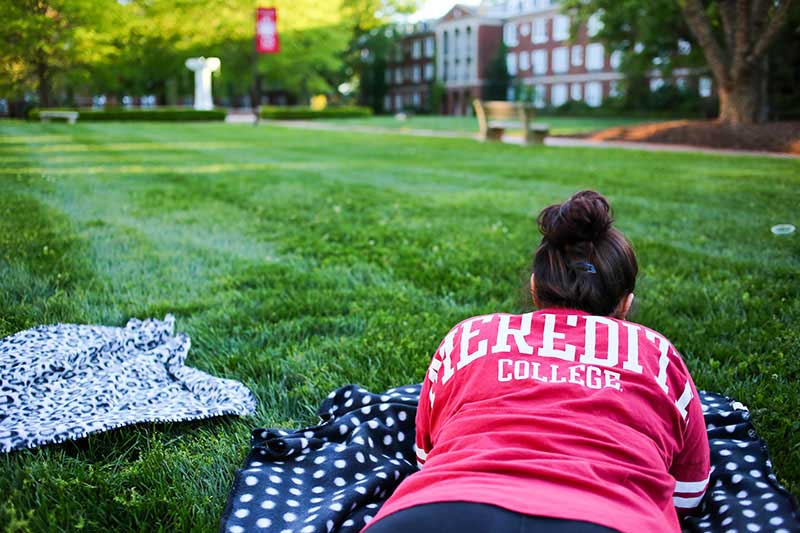Psychology Faculty Assess Meredith Students’ Adjustment to COVID-19
- By Gaye Hill
- Published

Last spring, when COVID-19 emerged as a significant public health threat, Meredith students, faculty, and staff had to abruptly pivot and begin learning, teaching, and working remotely.
While focused on ensuring their classes continued uninterrupted, three psychology faculty members saw an additional need that went beyond the very real demands of teaching their students in an entirely new reality.
“I’m a psychologist and a scientist. Data is really important. I was worried about our Meredith College students and our community,” said Andrea McPherson, associate professor of psychology. “It was not just an opportunity, but almost a duty.”
McPherson collaborated with Professor of Psychology Gwynn Morris and Assistant Professor of Psychology Betty-Shannon Prevatt to develop a study titled “Coping and Mental Health Challenges in College Students during the Covid-19 Pandemic.” They plan to submit their study for publication.
They worked with Dianne Raubenheimer and Dilnavaz Sharma from the Office of Research, Planning, and Assessment to develop and deliver the survey, which drew 495 undergraduate and graduate student responses initially, and 191 responses to a follow-up survey sent during the last week of the spring 2020 semester.
Early Findings
The aim of the study was to track student adjustment, both from an interpersonal as well as an academic standpoint, in response to COVID-19 during the spring semester. The study considered how the pandemic was affecting students’ lives (media usage, social distancing behavior, stress and loneliness); how it was affecting their mental health (anxiety and depression); how students were responding to the situation (coping and resilience); and how the pandemic was affecting students academically (academic self-efficacy, or how students perceive their ability to do academic tasks).
Student adjustment measurement included questions related to strategies used to cope with the pandemic, as it is known that one way to prevent poor psychological adjustment from general life stress would be to employ healthy coping mechanisms. The study also assessed student perception regarding the process and changes made to their academic experience in order to inform best practices in an unprecedented situation.
While the data is still being analyzed, findings suggest that initially, student anxiety was elevated but then decreased as the semester progressed, while there was a slight increase in depression among respondents. Perceptions of academic self-efficacy saw a substantial drop, which was concerning to all of the study’s authors.
“Academic self-efficacy is tied to grades. There’s a pretty strong correlation between how students perceive their ability to be successful and how that translates into grades. Having that drop in academic self-efficacy means the stress they were experiencing, the transition to online, all of these factors are playing into a lower sense of self-confidence and their ability to be successful,” said Prevatt.
She noted that lower self-efficacy is also tied to enrollment, because students with lower self-efficacy who don’t receive support are less likely to come back to school or experience gaps in their education.
“We need to provide support for our students to help bolster their self-efficacy so they don’t interpret that lower self-confidence to mean they shouldn’t be in school.”
When students were asked what helped them get through the challenging semester, 40% of students indicated personal support was key, from family and friends but also from Meredith professors.
“Support is a big deal,” said McPherson. “If we are expecting their confidence to waver it’s important for faculty and staff to make sure we’re there for them.”
Students who were most vulnerable to the drop in self-efficacy were those who were experiencing higher levels of depression and those with severe anxiety at the start of the pandemic.
Those who spent more time reading disaster-related media were also more vulnerable, specifically reading articles online. Surprisingly, consuming similar content via social media or news on television did not have the same impact.
“This is important information for everyone, not just students,” said Prevatt. “We should limit the time we spend reading articles. It’s a delicate balance because this is an ongoing crisis and information is ever-changing; we’re going to have to find a balance between obtaining necessary information and how much time you spend immersed in it.”
The study also included a number of open-ended questions. These provided an abundance of qualitative data that, once analyzed, will yield valuable insights about how students are handling this challenging situation.
Next Steps
The three psychology professors recommended that all Meredith faculty take pains to make students aware of the range of resources that are available, to emphasize the importance of well-being, and to remind students to practice self-care.
Prevatt noted the importance of taking steps that are evidence-based.
“It’s critical for us to use data to clarify where we should put our efforts,” said Prevatt.
Morris said the data pointed to areas of concern regarding potential student behavior in the coming semester, in particular related to social distancing.
“As the semester progressed, the amount of distancing decreased,” she said. “Over 30% were not cancelling or postponing large events in the spring.”
While worrisome, such behavior is understandable because of where students are developmentally, according to Morris.
“From a developmental perspective, friends fulfill their needs in a way that family members can’t, she said. “Friends are their support system.”
McPherson said it’s critical to share information gained from the study with the campus community before the College embarks on a semester that will include virtual learning; the team will share their findings with their colleagues during faculty/staff planning week.
“We need to empower our students and address that confidence in their learning and give them specific strategies to be successful,” said Morris. “This is a way for us to help take care of our students.”
News Director
316 Johnson Hall
(919) 760-8087
Fax: (919) 760-8330
PRINCETON REVIEW
U.S. NEWS
NICHE
3800 Hillsborough Street Raleigh, NC 27607-5298 | (919) 760-8600 Fax: (919) 760-8330 | © 2024 All Rights Reserved.